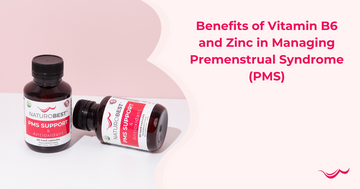Benefits of Vitamin B6 and Zinc in Managing Premenstrual Syndrome (PMS)
by Nikki Warren on Jun 18, 2024

Dealing with Premenstrual Syndrome (PMS) can feel overwhelming due to its wide range of physical and emotional symptoms.
Many women seek effective strategies to manage these symptoms, with dietary supplements being a popular approach. Among these, Vitamin B6 and zinc are often recommended.
But what roles do these nutrients play in managing PMS, and are there potential risks involved? Let’s delve into how Vitamin B6 and Zinc can help and answer some common questions about how they work.
Understanding the Role of Supplements in Managing PMS:
Supplements can play a crucial role in managing PMS by addressing nutritional deficiencies that may exacerbate symptoms. Among these, Vitamin B6 and Zinc are notable for their beneficial effects on both the physical and emotional aspects of PMS.
The Role of Vitamin B6 on PMS:
Vitamin B6 is vital for the production of neurotransmitters such as serotonin and dopamine, which regulate mood and stress levels. It has been shown to alleviate symptoms of PMS including mood swings, irritability, and depression. The vitamin works by enhancing the brain's ability to cope with stress and by potentially regulating hormonal fluctuations that occur during the menstrual cycle.
Vitamin B6 and Mood:
Many women report increased anxiety as part of their PMS symptoms. Vitamin B6 has been shown to help reduce mild anxiety associated with PMS. This is attributed to its role in enhancing the synthesis of GABA, a neurotransmitter that calms neural activity in the brain.
Effective Remedies for PMS:
A comprehensive approach to managing PMS includes both lifestyle changes and dietary adjustments. Regular exercise, adequate sleep, and a balanced diet are crucial. Supplements like Vitamin B6 and Zinc can be part of this holistic approach. They work best when combined with a diet rich in fruits, vegetables, and whole grains, which themselves help mitigate PMS symptoms.
Zinc’s Role in Managing PMS:
Zinc plays a critical role in hormonal balance and release, immune function, and cellular metabolism, all of which can influence PMS symptoms.
It helps regulate the menstrual cycle and is essential in the production of progesterone, a hormone that can mitigate PMS symptoms. This is why we include zinc in our PMS Support & Antioxidant.
Additionally, zinc contributes to the synthesis of neurotransmitters like serotonin, which helps regulate mood and emotional well-being. Ensuring adequate zinc intake through diet or supplements can be a key strategy in alleviating PMS symptoms and promoting overall reproductive health.
Zinc can be found in a variety of foods and supplements, making it accessible for those looking to increase their intake. Rich dietary sources of zinc include meats such as beef, lamb, and poultry, as well as seafood like oysters, which are particularly high in this mineral. For vegetarians or those looking to diversify their sources, beans, nuts, whole grains, and dairy products also provide substantial amounts of zinc.
Additionally, zinc supplements are available in various forms, and zinc citrate dihydrate is a form which is well absorbed by the body and well tolerated. This may be useful for those struggling to get zinc into their diet from food alone. You can find this in our PMS Support & Antioxidant – a daily dose (2 caps) contains 50mg of zinc.
Vitamin B6 and Zinc offer promising benefits for those struggling with PMS, addressing both the physical pain and emotional fluctuations that characterise this condition.
However, it’s crucial to use these supplements correctly to avoid potential side effects. Always read the label and follow the directions for use.
FAQs:
Can taking Vitamin B6 and Zinc together help with PMS?
Yes, taking these supplements together can be beneficial as they both contribute to hormonal balance and improved mental health, making them effective for managing a range of PMS symptoms.
Are there food sources of Vitamin B6 and Zinc?
Absolutely! Vitamin B6 can be found in foods like bananas, spinach, and salmon, while Zinc is abundant in meat, shellfish, and legumes. Incorporating these foods into your diet can help boost your intake of these nutrients.
The recommended daily amount of Vitamin B6 for adult women is about 1.3 to 1.5 mg, and for Zinc, it’s 8 mg. Dosages can vary based on individual health needs, so it’s best to consult with a healthcare provider.
If you've found these tips helpful, or if you have questions or suggestions, please feel free to reach out to us. We will continue to explore effective ways to manage PMS and promote women's health, to help bring balance wherever we can.




